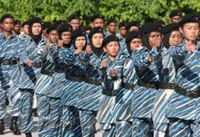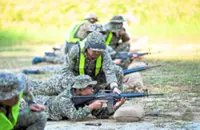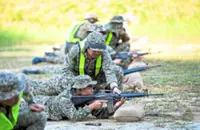PETALING JAYA: On a cloudy January day, a bunch of 18-year-olds got a brief taste of political power.
They were among the first batch of the revamped National Service Training Programme, or PLKN 3.0. On that day, they simulated the running of a general election and what it’s like to form a government.
According to PLKN department director Mej Jen Datuk Ya’cob Samiran, the simulation was one of the core lessons in the programme’s civics or nation-building component, which forms 30% of the training.
“Another activity centres around learning about Malaysia’s diverse cultural and religious landscape, and how to navigate and seek compromise among people from different backgrounds,” he said at a recent media briefing.
The aim of civics is to immerse trainees, who turn 18 when they enrol, in the processes that make Malaysia the country it is and to help them understand their role in those dynamics, he said.
PLKN’s new management under Mej Jen Ya’cob is hoping that vital life lessons like these will help the programme gain public support after its previous iterations were regularly criticised for being mismanaged.
Beyond the oft-repeated aims like “instilling patriotism” and “strengthening national identity”, PLKN 3.0 wants to train the social leaders of tomorrow, he added.
Besides introducing trainees to community volunteerism, it also teaches them how to organise such activities in their own neighbourhoods and the benefits of such programmes, according to materials at the briefing.
“The selling point is that these 45 days offer training that they cannot get anywhere else,” said Mej Jen Ya’cob, pointing out that the programmes at military bases are mostly for those who won’t continue their studies after their Sijil Pelajaran Malaysia examinations.
For those who will be going to public universities and colleges, the department is designing a different PLKN course that takes place in their institutions, he said.
PLKN’s modules in the military camps couple the civics courses with basic military training to instil discipline and raise physical fitness along with skills such as navigation and outdoor survival.
“Also included are lessons on national challenges and threats to give trainees a broader worldview,” said Mej Jen Ya’cob.
These include food and environmental problems and security as well as threats of cybercrime and terrorism.
The programme also includes critical life management courses for young adults, such as smart financial management, lessons on avoiding risky behaviours and sexually transmitted diseases, and important tips on taking care of mental health.
“In PLKN 3.0, we also want to introduce youths who have just finished high school, but who are not pursuing tertiary education, to viable career paths because we don’t want them to just end up as gig workers,” said Mej Jen Ya’cob.
A component that is being held at the tail end of the PLKN comprises briefings on the many technical and vocational schemes in the market and a mini-career fair.
PLKN 3.0’s structure, Mej Jen Ya’cob said, was developed from public feedback gathered from several studies by local universities and the Defence Ministry’s own think-tank, Midas.
“A study done by a Youth and Sports Ministry agency, IYRES (Institute for Youth Research Malaysia), found that rates of volunteerism, competitiveness and patriotism among young adults had dropped after PLKN was discontinued in 2018,” he added.
In Midas’ own 2021 study, over 3,000 respondents throughout the country were polled on whether they felt that the programme should be revived.
“More than 85% of the respondents said it should be revived, 89% said the programme should include basic military training and about 71% said some version of it should be taught in schools,” Mej Jen Ya’cob noted.
This is why along with the programme for young adults, the government is crafting a scaled-down version for Form Four students that is slated to be launched sometime this year.
“That programme will also be compulsory for all Form Four students but will only take place over three days and two nights,” he added.





